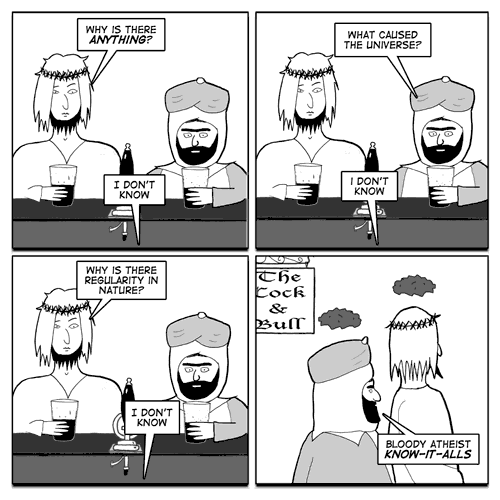"I don't know" is a perfectly respectable answer when, indeed, we
don't know. It doesn't mean that we won't ever know, and it certainly doesn't mean that we should stop looking for answers. "I don't know" might not be a very satisfying answer, but it's often the only accurate one.
It does not, in particular, mean that "God did it." Rationally, we can't just invent a comforting fairy tale to cover up the gaps in our knowledge. Long ago, when people didn't know what the sun was - and "I don't know" wasn't emotionally satisfying - they assumed it
must be a god in a golden chariot. After all, what else could it be?
Now we know how wrong that was. But this kind of error persists today, despite centuries of finding natural explanations for what used to be considered supernatural (and never once the reverse). We don't know what caused the universe, if indeed it had a "cause" at all. But "I don't know; therefore God must have done it" is fallacious reasoning. In order to rationally believe that "God" did anything at all, you must have evidence
for that belief. Belief must always be based on knowledge, not ignorance.
And no, I don't know that a god or gods
don't exist, either. I don't know that leprechauns don't exist, or flying unicorns, or werewolves. There's probably an infinite number of things I can't prove don't exist. But in all cases, unless I have good evidence that they
do exist, it would be irrational for me to believe they do. Pretty clearly, that would be just wishful thinking.
That's why I call myself an atheist, rather than an agnostic. I'm an agnostic, too, of course. At least, I completely agree that I can't rule out
any kind of god, not even the
Flying Spaghetti Monster. But why would I "believe" in anything without evidence? And if you don't believe in the supernatural, you're an atheist. That seems clear enough.
It's also true that we don't ever know
anything for certain, at least without even the slightest possibility that we could be wrong. Some things are more certain than others, and we can often be sure beyond any
reasonable doubt, which is a good practical standard for "knowing." But, theoretically at least, nothing can be known to such a certainty that we wouldn't change our minds given sufficient evidence that we'd been wrong.
So let's not nitpick here. I "know" that the Earth is round (roughly speaking) and that it revolves around the Sun, since there's abundant evidence of this. Of course, I can think of several possibilities where this could be wrong, but since there's no evidence behind them at all, I can easily dismiss them as explanations of the real world.
Evidence is the key. We can still be wrong - we remain fallible - but evidence-based thinking is demonstrably superior to any other way of determining the truth, especially when it's combined with the careful procedures of the scientific method. There's still a lot we don't know (and I hope that will always be the case), but "I don't know" doesn't imply anything else at all.
It certainly doesn't imply that
you know.






2 comments:
I agree with the point you are making, Bill, but there is an issue concerning the use of the term "atheism" which is often picked on by the religious. That concerns whether there is any distinction between "I do not believe there is a god" and "I believe there isn't a god".
On the face of it these look much the same and most people would probably use them interchangeably, but the latter is argued by the religious to be a "belief" which has no more evidential basis than their own beliefs.
So I prefer to avoid the label "atheist" and just say "I have no religious beliefs".
Yes, Tony, and that's a problem with labels in general. If you label yourself, those who believe otherwise will try to define that label. It's happened in this country with that dreaded term, "liberal."
But I find that "atheist" catches people's attention better. Few nonbelievers want to use that label, or any label at all. According to the Pew Forum, only 1.6% of Americans describe themselves as atheists and 2.4% as agnostics, but 12.1% say "nothing in particular" with regard to religion. Not all of them are nonbelievers, of course, but still, that's suggestive.
(Yes, I know those statistics look pathetic compared to Great Britain, Tony. But even here, admitted atheists and agnostics number as many as Jews, Muslims, and Mormons combined.)
Anyway, like you, I used to just say I had no religious beliefs. But I find that "atheist" gets people's attention. And if they try to argue that atheism is just another belief, I can explain in detail why that isn't true, at least for my interpretation of the term. (And since I'm using the label to describe myself, I should be able to define what I mean by it, at least within reason.)
Post a Comment